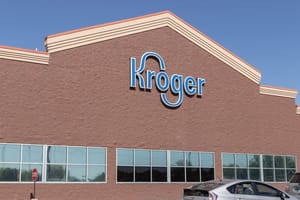Kroger Moves to Standardize, Simplify Use-By Labels
Effort will reduce confusion, at-home food waste, retailer says. Kroger is aiming to reduce food waste through revamped expiration date labeling that also gives customers better detail on product quality and "best by" use.
October 16, 2019

In a move the company says will better inform consumers and make a positive social change, The Kroger Co. said it would evolve labels on its private brand food products to provide easier-to-understand information about product quality and expiration dates.
The Cincinnati-based retailer said the change, which began earlier this year, would reduce consumer confusion around use-by dates while reducing food waste through its ongoing Zero Hunger Zero Waste campaign.
Earlier this year, Kroger began to transition the line so that each of its food products feature one of two types of date labels: a "Use By" label, which is used to represent food safety and indicates the deadline for when the product is no longer safe to eat; an a "Best if Used By" label, which represents food quality and indicates the company's best suggestion for guaranteed freshness but does not affect the product's safety. All of Kroger's own-brand line's simplified labels apply to multiple product categories, including dairy, deli, bakery, fresh and frozen grocery.
"Kroger recognizes food waste often takes place in our customers' kitchens simply because product date labels can be confusing, resulting in safe-to-eat food regularly being tossed out," said Howard Popoola, VP of corporate food technology and regulatory compliance for Kroger. "As Kroger works to reduce food waste throughout our business and our communities, we are standardizing and simplifying Our Brands products' date labels, providing clearer guidance to our customers."
Paradoxically, the company points out, that 1 in 9 Americans struggle with hunger every day, while 40% of the food produced in the country goes uneaten, which includes the food waste created in shoppers' households. And according to ReFED research, about 20% of avoidable food waste comes as a result of confusion about whether owned food items are still fresh or not.
"Standardized date labeling is one of the most cost-effective solutions to reduce food waste and provide more resources to food banks across the country," said Chris Cochran, executive director of Berkeley, Calif.-based ReFED. "We applaud Kroger's continued leadership on food waste reduction through its Zero Hunger Zero Waste plan, and ReFED is proud to partner with America's largest grocer to help the retailer achieve its bold, commendable goal by 2025."
Kroger says that it will complete the date label transition for its Our Brands line in 2020.
About the Author
You May Also Like




